General
Mak DARP Project Launch to Revolutionise Management of Academic Records
Published
2 years agoon
By
Mak Editor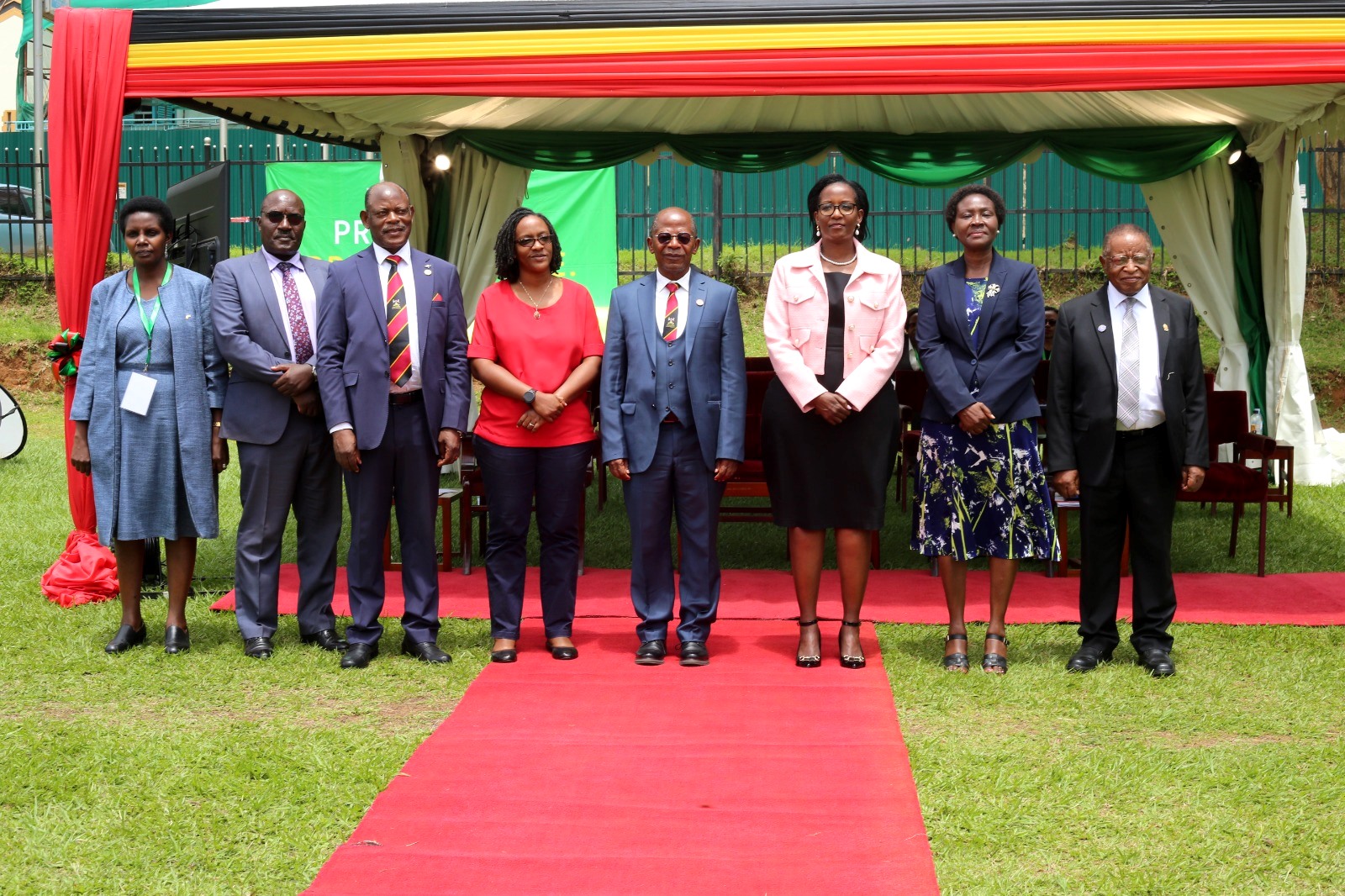
By Ritah Namisango
“This initiative, funded by the Government of Uganda through Makerere University Research and Innovations Fund in partnership with the Mastercard Foundation, represents a significant step forward in our efforts to modernize and digitalize our academic processes. It’s therefore with great pleasure and pride that I launch the Digitalization of Academic Records and Processes project at Makerere University, and I commission the Registry of Students’ Records and the Archive of Students’ Records,” stated the Minister of Education and Sports, Hon. Janet Kataaha Museveni represented by the State Minister for Higher Education, Hon. John C. Muyingo.
As the world continually evolves from manual and traditional methods of records management to modern and digitalized processes, Makerere University launched the Digitalization of Academic Records and Processes (DARP) project to ease the storage, retrieval and acquisition of academic documents by her stakeholders.
The project has digitalized records and implemented new processes as well as established a digital state-of-the-art storage facility at the Senate Building to securely store university academic documents. The digitization process comes along with a university policy that guides on how to record, manage, retrieve and dispose of records not in use. This project is designed to reduce on the substantial amount of space that paper storage systems occupy as well as safeguard records from disasters like fire.
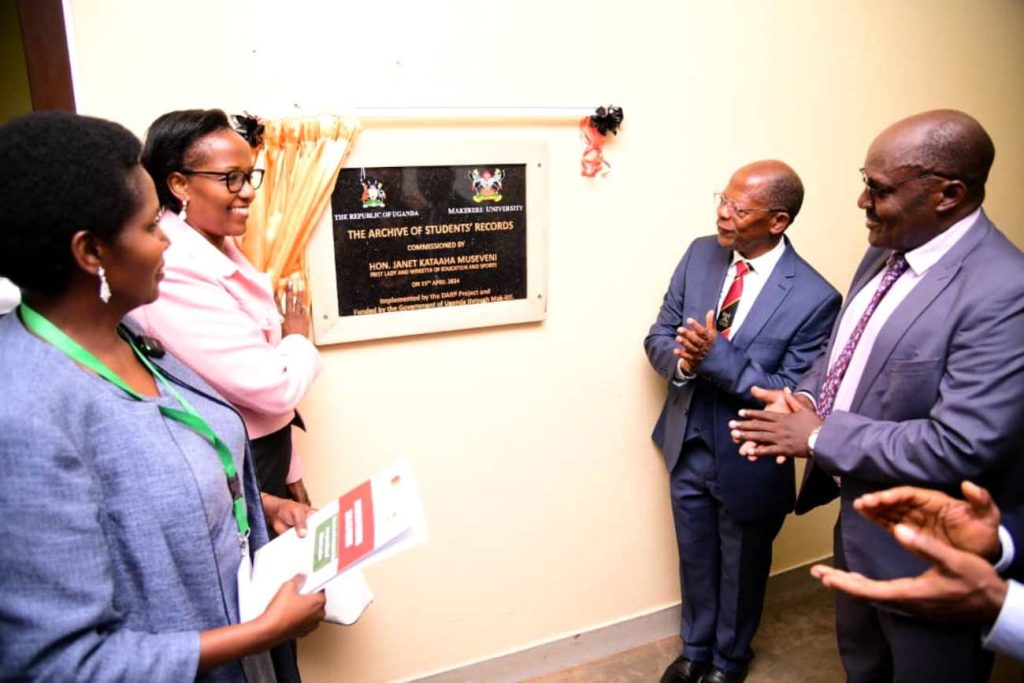
Officiating at the launch of the DARP project on Friday 19th April, 2024 at Makerere University Freedom Square, Hon. John C. Muyingo, affirmed on behalf of Hon. Janet Kataaha Museveni that the launch was a significant milestone in the history of Makerere University.
The Education and Sports Minister further noted that in today’s fast-paced world, universities must manage massive amounts of academic information, and efficient record keeping necessitates that the information is accurate, accessible and secure, benefiting both the institution and its stakeholders. She noted that the DARP system would streamline the processes of managing and accessing academic records, resulting in significant timesaving for students and other stakeholders at the university and beyond.
“Digitalization of academic records and processes is an innovation set to revolutionize the way records are managed by addressing pressing public concerns such as efficiency, security, integrity and accessibility as well as eliminating the unnecessary delays in the processes. The traditional manual approach, while effective in its time has become increasingly challenging to sustain in this digital world, therefore, digitalizing academic records and processes provide crucial responses to the monotonous questions that the outdated manual system never addressed,” stated the Minister’s speech.
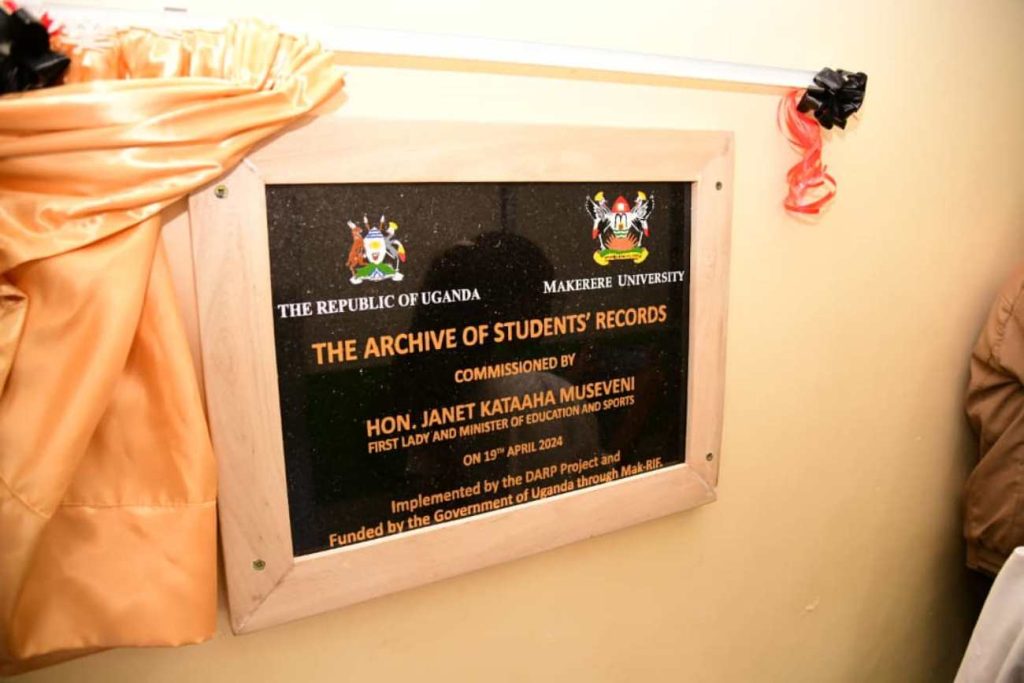
Having outlined the challenges and risks that the traditional paper-based record keeping systems present such as the storage space factor, the risk of mixing active and inactive records, the high rate of wear and tear as well as vulnerability to manipulation of records, the Minister commended Makerere University on the enviable track record of efficiently managing and securely storing its academic documents, Senate minutes, curricula, examination results and students files for nearly a century, despite political upheavals and other challenges.
She observed that digitalized systems would make academic records more accessible to the students and eliminate the frustration of delays caused by bureaucratic inefficiencies and the outdated paper system, enabling them to timely take the necessary steps in academic and professional progression.
As the University embarked on its journey of digital transformation, Hon. Janet Kataaha Museveni equally applauded Makerere for continuously upholding its commitment to academic excellence, research and innovation. She advised the fraternity to stay committed to the principles of innovation and inclusiveness that define the University. As such, she urged them to embrace the digital transformation wholeheartedly so as to harness the power of technology and enable Makerere University to remain a beacon of excellence in the academic world.
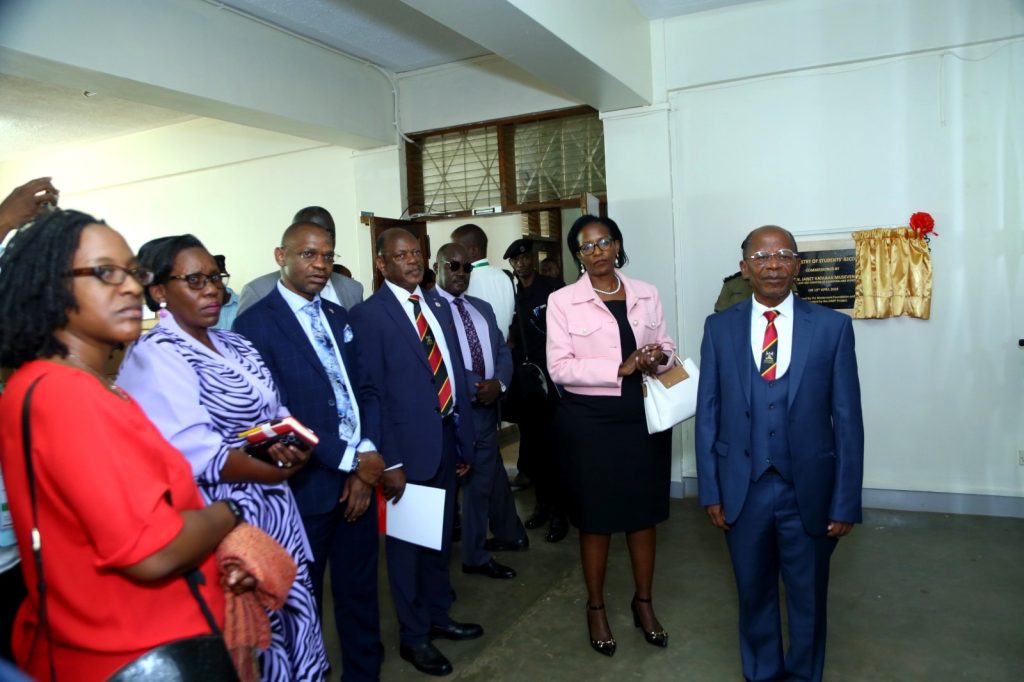
“Since its establishment in 1922, Makerere University has been a beacon of knowledge and learning, shaping the minds of generations of students and contributing significantly to the development of our nation, Africa and the world at large. Thank you for these brains. Your hard work, expertise, and dedication were instrumental in building this DARP project to realization. I am confident that you will have a lasting and positive impact on this university and the entire education sector, not only in Uganda, but the entire world,” said Hon. Janet Museveni.
The First Lady expressed her gratitude for the partnership with Mastercard Foundation and the support it renders in advancing education and innovation at Makerere University.
The Vice Chancellor, Prof. Barnabas Nawangwe highlighted that the launch of the DARP project was not only a landmark achievement for Makerere University, but also a confirmation of the importance that the University Council and Management attach to the role that digitalization and e-services play in implementation of the University strategic plan that continually strives for a professionally managed university.
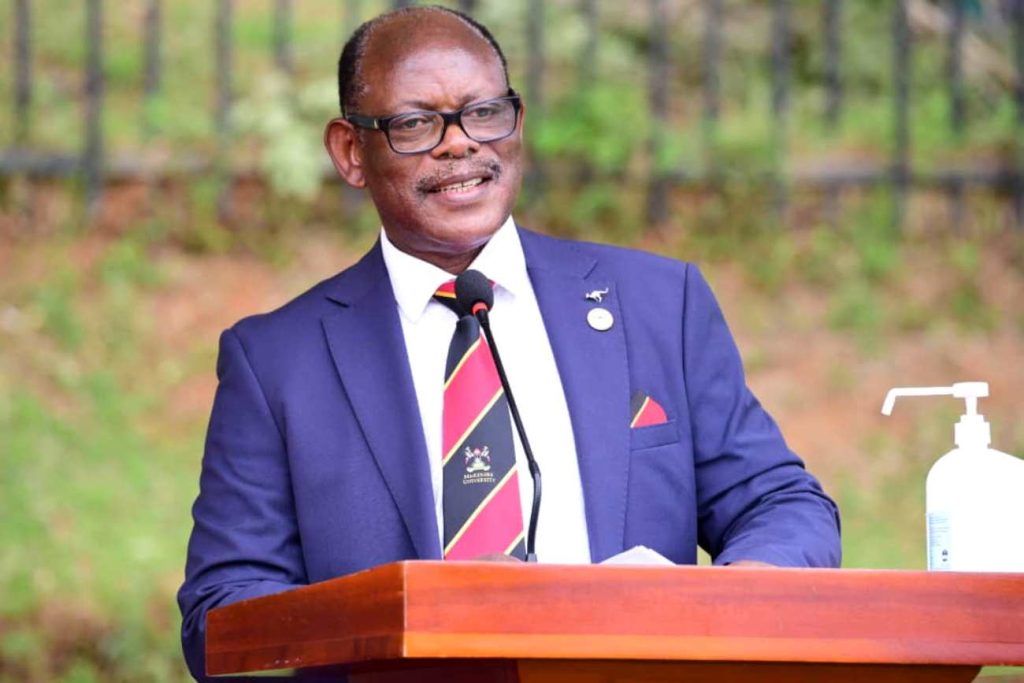
The Vice Chancellor revealed that the official launch of the DARP Project, undertaken in-house by a hardworking team of University staff, was a financial gain on the part of the University and an additional asset in the quest to improve efficiency and effectiveness as far as the University academic records and processes are concerned.
“Our current drive has been the continued digitalization of various business processes and services so as to be more responsive to the dynamic needs of our students, staff and stakeholders. We have been able to achieve this through intentional development of our in-house information systems development capacity, which has saved us a lot of funds in terms of initial purchase as well as annual license renewal costs,” said the Vice Chancellor.
Prof. Nawangwe stated that the DARP project has greatly contributed to the timely and improved service delivery to students and clients. He added that the ultimate goal is to enable students download their own transcripts without need for elaborate physical processes at the university.
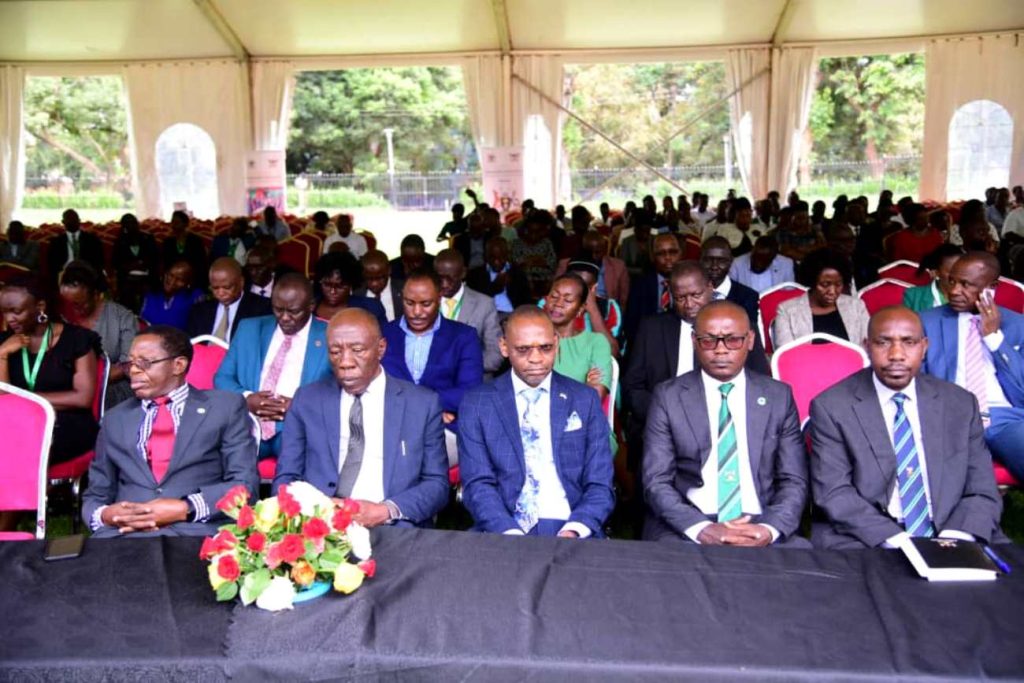
“During the 74th graduation ceremony, Makerere University was able to issue academic transcripts to qualifying students before graduation. I am pleased to inform you that we succeeded in issuing of academic transcripts before the graduation date because of the DARP project, which we are launching today. With the digitalization of students’ academic records, the University is now in a better position to provide the required information and data on time,” said the Vice Chancellor.
Prof. Nawangwe elaborated that Makerere, being Uganda’s Premier University has been a major beneficiary of several initiatives aimed at improving ICT infrastructure and connectivity. He added that the University has been able to achieve this largely due to the generous donations of the Government of Uganda and other development partners. He thanked His Excellency Yoweri Kaguta Museveni, the President of Uganda whose support led to the creation of the Research and Innovations Fund (Mak-RIF) in the 2019/2020 financial year with initial funding of UGX 30 Billion.
He revealed that the funding has continued to be availed throughout the last five financial years, which is clear demonstration that the Government of Uganda esteems Research and Innovation as catalysts to Uganda’s continued march from a peasant to a modern and prosperous country.
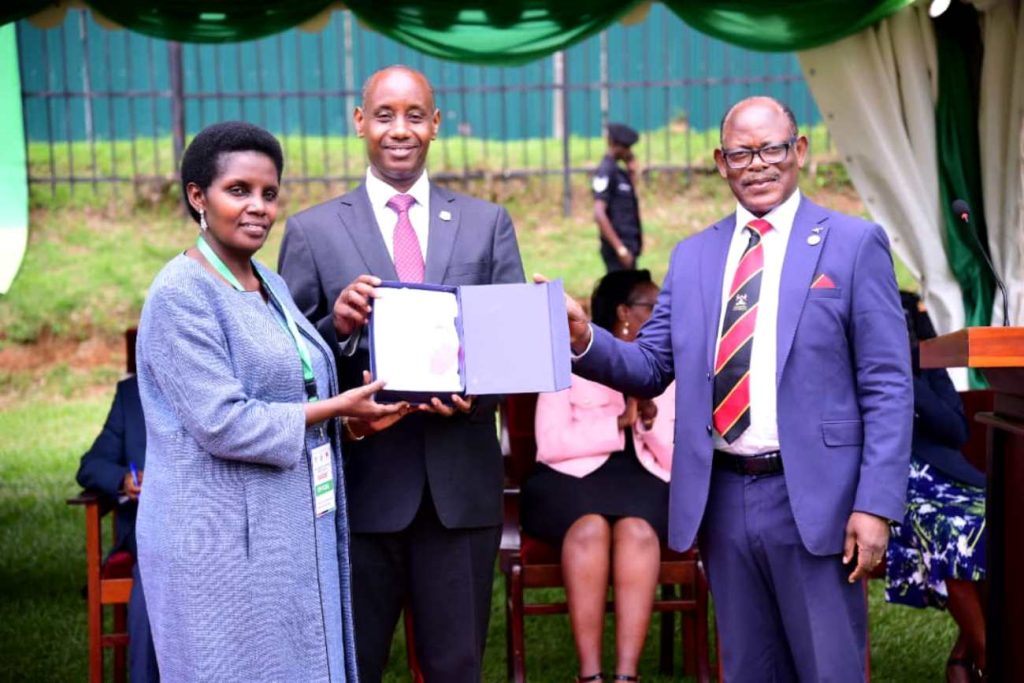
“I am proud to say that Mak-RIF has transformed Makerere’s academic and research landscape tremendously. Over the last five Financial Years, we have worked with other key stakeholders including Government ministries, institutions, agencies, organizations, and the private sector. Together, we have continued to increase the local generation of translatable research and scalable innovations that address key gaps required to drive Uganda’s development agenda, especially the un-funded priorities” stated Prof. Nawangwe.
In the same spirit, the Vice Chancellor applauded the Principal Investigator and Team Leader DARP, Mrs. Patience Rubabinda Mushengyezi and all the Team Members for the hard work that has improved the status of academic records and processes from manual processes to e-services. The DARP project is a collaboration between the Academic Registrar’s Department, College of Education and Externals Studies (CEES), College of Computing and Information Sciences (CoCIS) and the Directorate of Information and Communication Technology Support (DICTS). The DARP Project team includes: Prof. Betty Ezati, Dr. Peace Tumuheki, Dr. David Luyombya, Dr. Joyce Bukirwa, Ms. Ruth Iteu Eyoku, Mr. Juma Katongole, Mr. Joshua Muhumuza and Mr. Lubowa Gyaviira.
The Vice Chancellor also thanked the Makerere University Research and Innovations Fund (Mak-RIF) and the Mastercard Foundation for supporting different phases of the DARP Project.
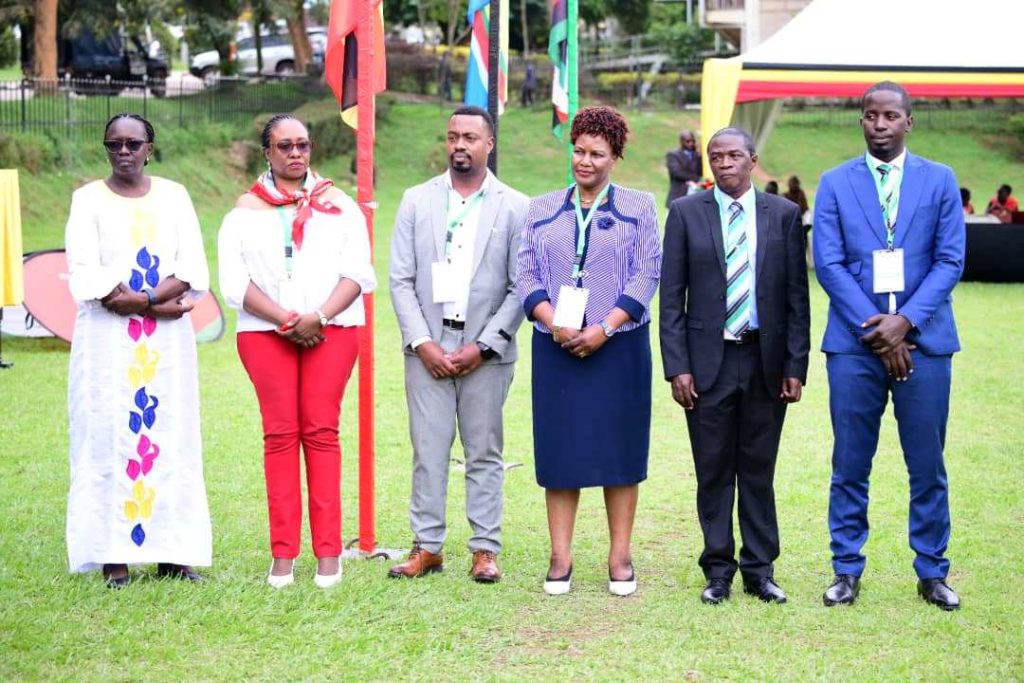
Mrs. Lorna Magara, the Chairperson of Makerere University Council acknowledged that launching the DARP project at Makerere University marked a significant step forward in digitalizing higher education services. She underscored that the transformational power of digitalization could not be overstated. She stated that by implementing an Academic Records Management System, the University would streamline the tracking and retrieval of academic files and establish a robust platform for digital certification and record verification.
“In an era where credential fraud poses a significant challenge, the DARP Project reinforces transparency, trust, and confidence in our academic processes. It is testament to our commitment to excellence. The DARP Project heralds a new era; one where our certificates and transcripts are shielded against increasingly sophisticated forgeries. By providing digitally verifiable academic documents, we empower employers worldwide to expedite verification procedures,” she articulated.
The Chairperson stated that Makerere University aims to create a dynamic and integrated learning environment with a goal to equip students with the skills and knowledge needed to thrive in an ever-evolving world. She emphasized the need to prioritize student-centeredness and adaptability which vision perfectly aligns with the DARP Project to ensure that the most deserving students can compete fairly in the job market alongside genuinely qualified candidates.
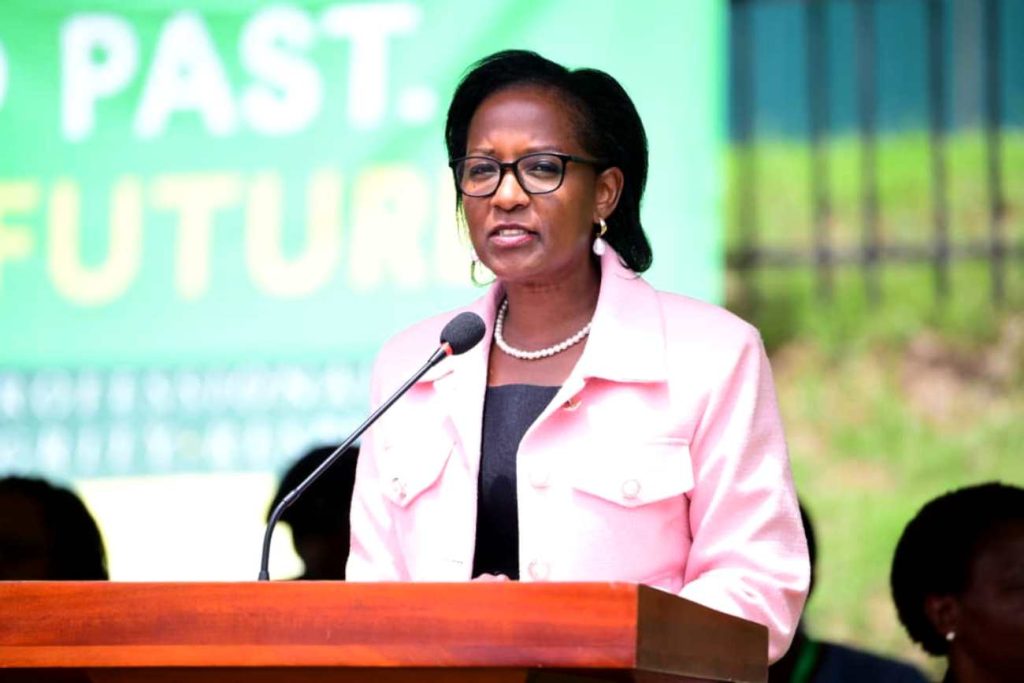
She advised that a system’s effectiveness hinges on the quality of input it receives, therefore, meticulous attention to detail is essential to ensure that the necessary information is accurately fed into the system to yield the expected outcomes. She recommended that vigilant effort has to be invested in ensuring quality processes in how the information is gathered and fed into the system, and the quality of persons tasked to do the work.
Mrs. Magara praised the DARP Principal Investigator for initiating the project in support of the University’s efforts to; address the critical element of maintaining integrity of academic records, significantly contributing to the University’s commitment to digitizing systems, and upgrading the process of archiving of records for ease in verification, certification, and retrieval.
She also extended appreciation to the Government of Uganda for the provision of funds through Mak-RIF, and to Mastercard Foundation for the provision of equipment and other support that will facilitate safe processing and storage of the academic documents.
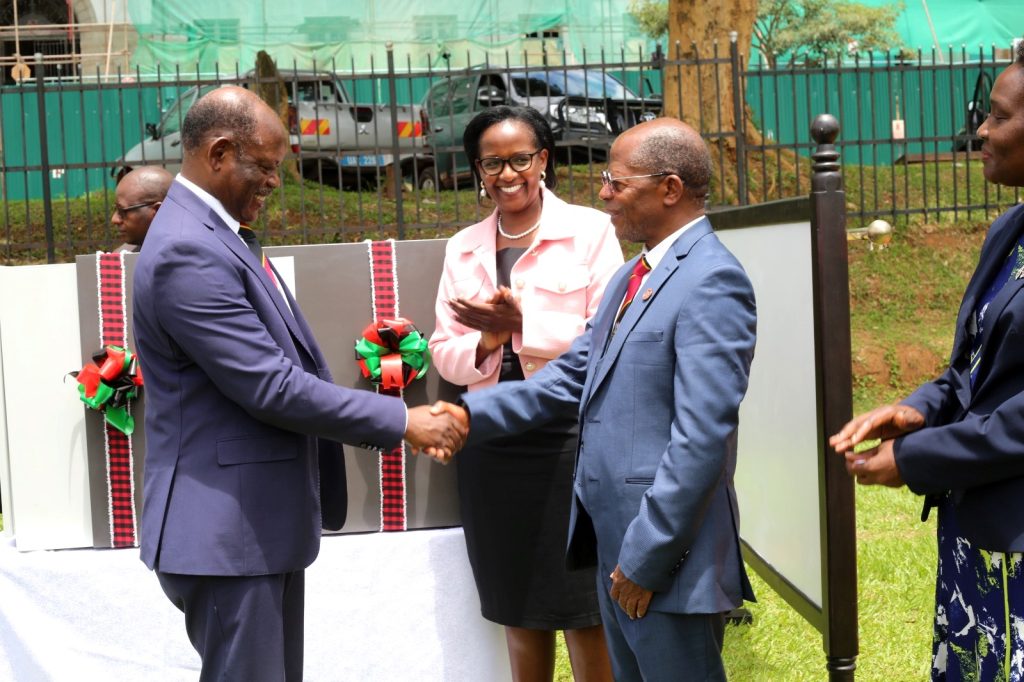
The Principal Investigator and Team Leader, DARP project, Mrs. Patience Rubabinda Mushengyezi proclaimed that the launch of the project was the birth of a new era in records management at Makerere University.
To enable the audience to understand and appreciate the situation before the DARP project, Mrs. Mushengyezi shared a documentary that highlighted the transformation from a purely manual process to a digital one. She added that the digitalization of student records from the 1980s changes the narrative of delays and long queues to fast, timely and friendly services to the students.
The Principal investigator disclosed that the DARP project team’s aspiration was to have the digitalization of students’ records rolled out in all the schools and colleges of the University. She observed that because of the hard work of the DARP team, they now have clear and well organized documents and the ‘ugly’ records shall never be seen again since they no longer exist. She expressed gladness that what started as a vision had become reality, culminating in the launch of the DARP project.
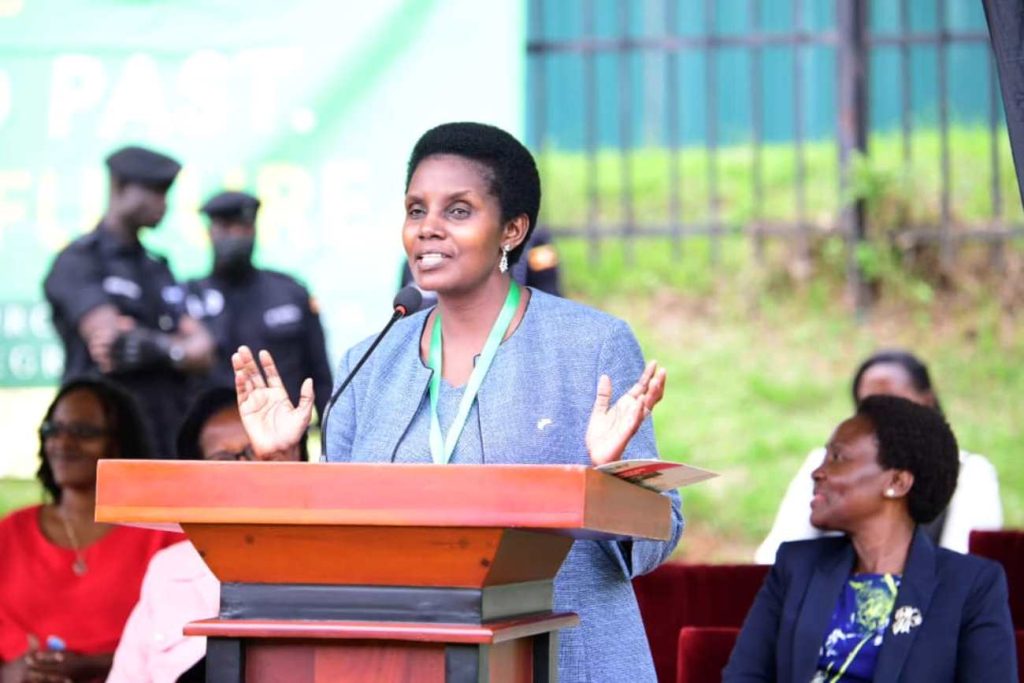
“Today, Makerere University is launching a new era of digital transformation in the management of students’ records and service delivery. We are changing the narrative of long queues, lengthy processes and we are now moving to efficient and digital services. We are here also to commission the registry of the students’ records and archive. The registry has been fitted with modern shelves with the capacity of storing over 30,000 students files but as we have seen, there is room for improvement and expansion. The archive has been fitted with modern shelves that have a capacity of storing over 100,000 students’ files and 21 wagons will store 170,000 students’ files,” Mrs. Mushengyezi declared.
Recalling the genesis of the DARP Project, Mrs. Mushengyezi shared that when the Government allocated support to the university’s research and innovations fund in 2019, she approached her colleagues and together, they submitted a project proposal. The project identified several challenges which were affecting records management at Makerere University namely; manual records handling, inadequate storage space, inadequate security for records, inexistent policy on records management, and lack of a system to streamline records management. The DARP project therefore set out to address these gaps with the ultimate goal of operating e-services.
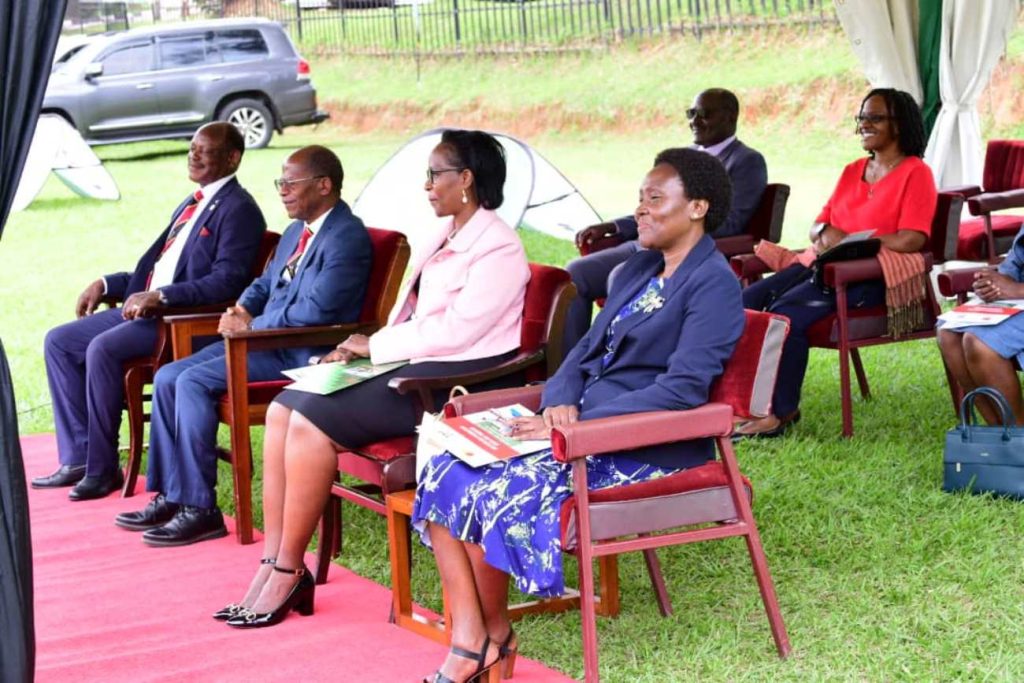
“The objectives of DARP Project were to digitalize academic processes including students’ files and examination results and other documents like senate minutes. We wished to establish a students’ records verification and certification Centre. We also wanted to use ICT to improve efficiency in conducting senate meetings and to archive existing manual documents into properly bound and referenced files. It has been a lot of hard work by the project team, but we have seen God’s hand in this transformational journey. I wish to say that we have achieved 95% of our objectives,” Mrs. Mushengyezi stated.
The Principal Investigator noted that the DARP project had created efficiency in the academic Registrar’s department with ability to generate reports on number of students by categories such as course, graduation cohort, academic disciplines i.e. Medicine, Law, Engineering etc., current enrolment and progression, as well as policies passed by the University Senate per year, and so on.
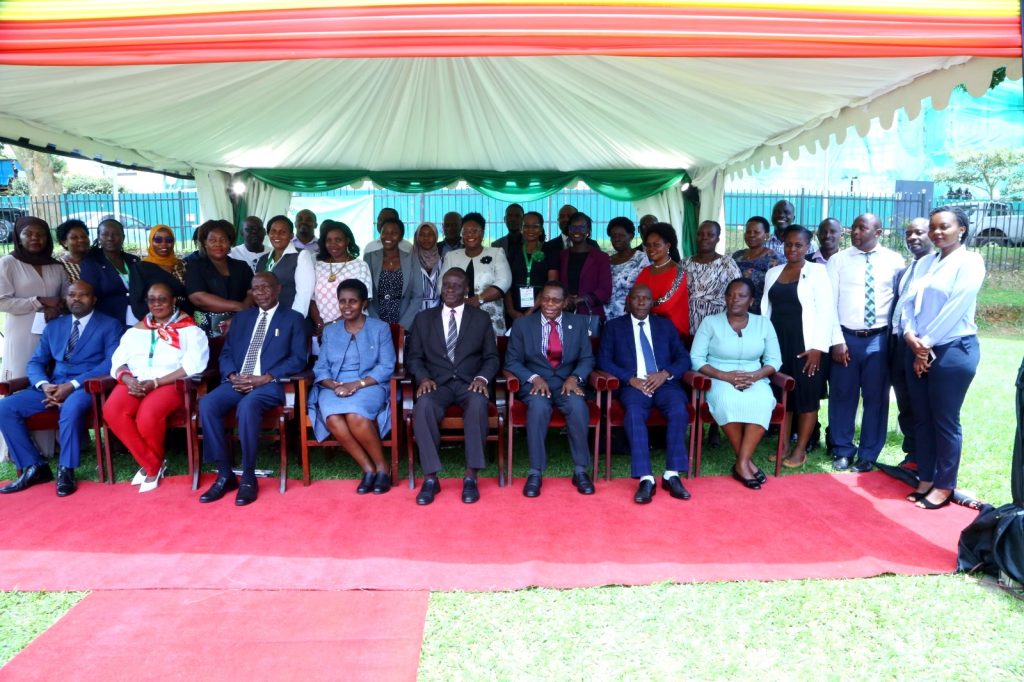
She thanked the Government of Uganda for funding the entire process by providing laptops, access control systems, CCTV cameras, printers, furniture, archival boxes, the 21 shelves, the wagons, stationery and facilitation of the entire team. She also thanked Mastercard Foundation for the support through the relief fund.
She appreciated the entire Makerere University Council and Management for the support rendered towards the establishment of the DARP project and for prioritizing the Project as a university programme. In a very special way, she acknowledged Prof. William Bazeyo, the former Deputy Vice Chancellor (Finance and Administration), Prof. Fred Masagazi Masaazi-Chairperson of Mak-RIF Grants Management Committee (GMC), Prof. Umar Kakumba, Deputy Vice Chancellor (Academic Affairs), Mr. Alfred Masikye Namoah, former Academic Registrar and the Academic Registrar, Prof. Buyinza Mukadasi, the University Secretary, Mr. Yusuf Kiranda, Deputy Registrars namely Mr. Charles Ssentongo and Mr. Tom Otim, for providing tireless support.
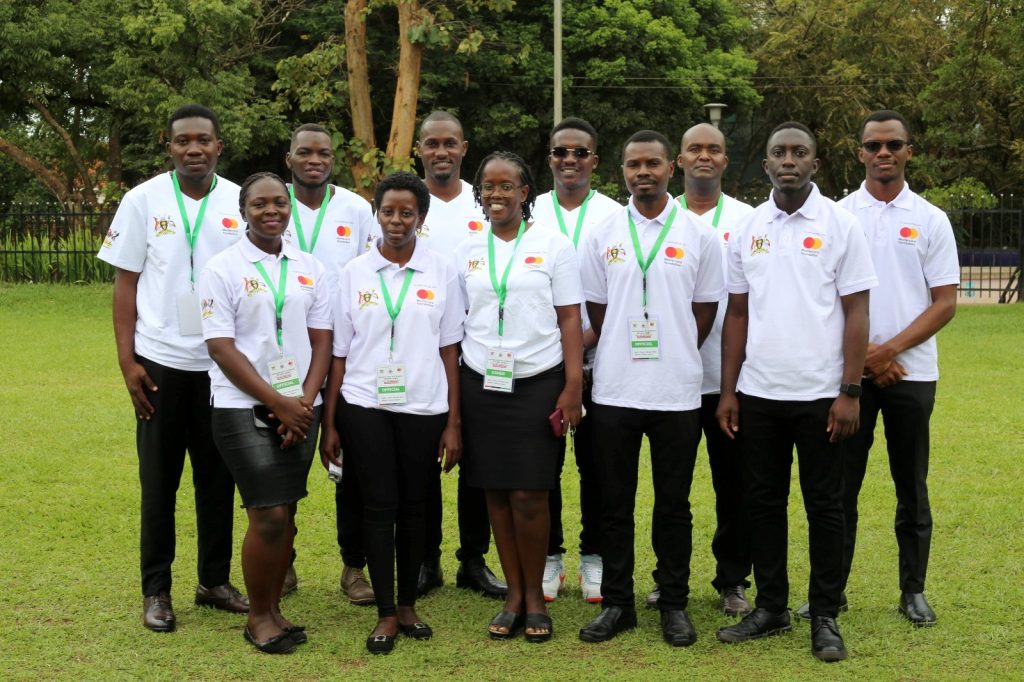
In addition, she recognized the supervisors in the Directorate of Research and Graduate namely Prof. Edward Bbaale and Ms. Prossie Nakayiki.
The Principal Investigator, Mrs. Mushengyezi also appreciated the members of staff whom she referred to as DARP Foot Soldiers for organizing, sorting and scanning the records.
In recognition of her selfless service and leadership, the DARP project team members through the Vice Chancellor, Prof. Barnabas Nawangwe presented Mrs. Patience Mushengyezi with a plaque and bouquet of flowers.
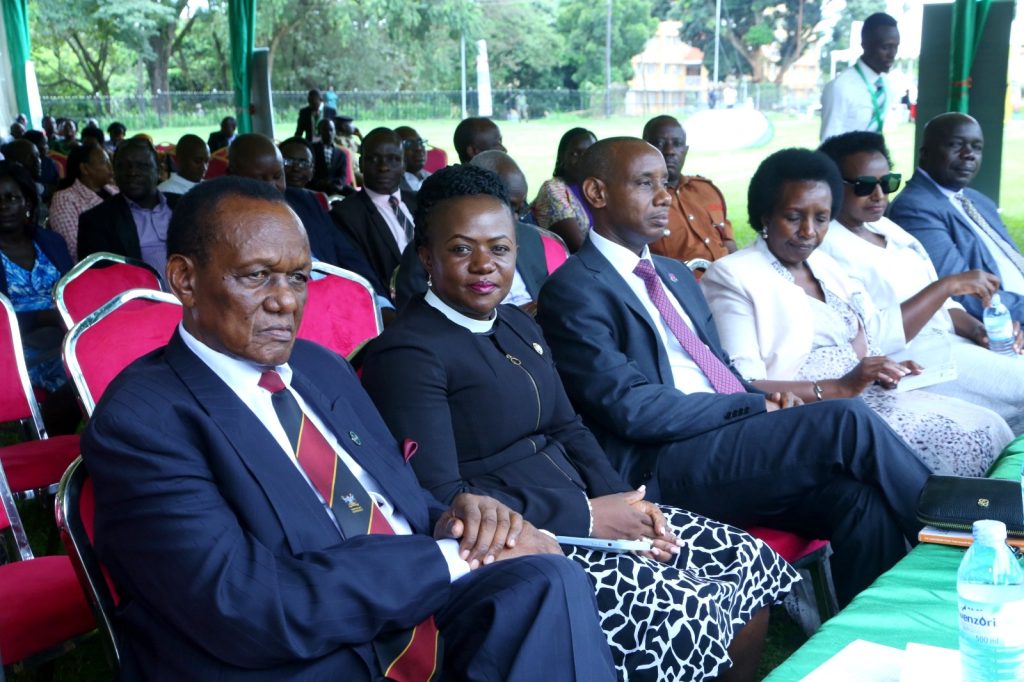
The DARP project launch was graced by the Chancellor Emeritus, Prof. Ezra Suruma, Members of Parliament, Vice Chancellors of other Universities, former Vice Chancellors, former Deputy Vice Chancellors in charge of Finance and Administration, the Makerere University Students’ Guild, and Mrs. Mushengyezi’s family. The Chaplain, St. Francis Chapel, Rev. Dr. Lydia Nsaale Kitayimbwa led the opening prayer while the event was moderated by Dr. Zahara Nampewo, the Deputy Principal of the School of Law and Ms. Ritah Namisango, Principal Public Relations Officer and Chairperson of the Protocol, Publicity and Media Sub-Committee for the launch. The Department of Performing Arts and Film was on hand to lead the anthems and keep the guests entertained.
You may like
-


Mak 76th Graduation Ceremony: CoNAS Presents 16 PhDs & Best Performing Male Student in the Sciences
-


CAES Presents Overall Best Performing Student in the Sciences & a Record 28 PhDs at the 76th Graduation Ceremony
-


Over 9,200 to graduate at Makerere University’s 76th Graduation
-
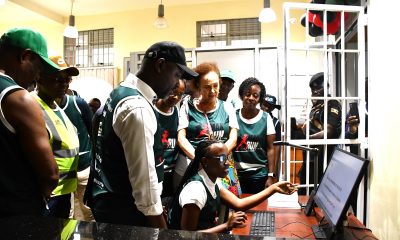

Students empowered to thrive through the Semester
-


Strengthening Global Partnerships to Advance Research, Innovation, and Graduate Training: Makerere University Hosts Delegation from the University of Warwick
-


Mastercard Foundation Scholars embrace and honour their rich cultural diversity

The Board Chairperson of the Makerere University Endowment Fund (MakEF), Dr. Margaret Blick Kigozi, has urged graduands in Health and Life Sciences to uphold professional ethics and serve humanity with diligence and compassion.
Her appeal came during the passing out of graduates from the College of Natural Sciences (CoNAS), the College of Veterinary Medicine, Animal Resources and Bio-Security (CoVAB), the College of Health Sciences (CHS) and the School of Public Health (SPH) on Day Two of the 76th Graduation Ceremony of Makerere University.
“Class of 2026, you are now part of the Makerere legacy. Wherever you go clinics, laboratories, farms, boardrooms, or classrooms, you carry this institution with you. Serve your patients with skill and compassion. Care for animals and communities responsibly. Question boldly and keep learning,” Dr Kigozi, said.
Delivering the commencement address, Dr. Kigozi lauded the graduates for their dedication to careers that directly impact lives and communities. She encouraged them to use their knowledge generously and exercise their power gently.
“Your education has trained you to ask better questions. Your humanity must guide the answers. Never forget that behind every chart, every case, every animal, every experiment, there is life. And life deserves care, patience, and dignity. Give every person you come in contact with care, patience and dignity,” Dr Kigozi, noted.
As the graduates embark on their professional journeys, Dr. Kigozi emphasized the importance of cultivating basic business acumen and financial literacy to ensure sustainability in their work.

“You do not need to become accountants but you must be able to read the essentials: understand simple financial statements, budgets and key metrics so you can judge whether a clinic, lab, or program is sustainable. You are encouraged to start your business. There are numerous investment opportunities in your areas of training. You can provide services to our people and create jobs,” Dr Kigozi, said.
She shared candidly how, when she first stepped into leadership, she realised she did not understand balance sheets or budgets well enough. So, she returned to Makerere for short courses to strengthen herself.
“A well-run Hospital, clinic or lab delivers better outcomes, attracts staff, and secures funding. Business savvy is not only about profit, it’s about sustainability and the freedom to serve ethically and effectively. Carry clinical skill with business sense so your work endures and grows,” Dr. Kigozi, noted.
Quoting renowned writer and producer Shonda Rhimes, creator of Grey’s Anatomy, who once reflected that succeeding in one area of life can sometimes mean falling short in another, Dr. Kigozi encouraged women graduates to intentionally balance professional ambition with family responsibilities.
“When one area thrives, another is often under strain. When Navio was graduating from school I had to manage the Presidential Investor Round Table on the same day as Executive Director Uganda Investment Authority. I chose my job and delegated his siblings to attend Navios graduation. I learnt from this. I choose family always after that thing you achieve once and keep forever,” Dr Kigozi, said.
In his speech, the Prof Barnabas Nawangwe, the Vice Chancellor, informed the congregation that Makerere’s ranking on all university ranking platforms has remained stable, placing Makerere among the top 10 African universities and within the top 4.5% globally.
“In the Times Higher Education global ranking, Makerere University made a formidable jump from the 1200-1500 bracket to the 800-1000 bracket. This was no mean achievement and I congratulate all members of the Makerere Community on this stellar performance,” Prof Nawangwe, said.
General
Graduation marks the next phase of accountability, graduates told
Published
2 days agoon
February 25, 2026
“A degree is not a finish line. Graduation is not the end of learning, It is the beginning of accountability,” Prof. Nicholas Ozor, the Executive Director of the African Technology Policy Studies Network Nairobi, Kenya (ATPS), said.
Delivering a keynote address under the theme ‘Knowledge with purpose’, during Makerere University’s 76th graduation ceremony on Tuesday 24th February, Prof Ozor, challenged graduates to see their degrees not as status symbols, but as instruments of responsibility.
In his speech, he painted a candid picture of the world the graduates are stepping into, one marked by climate change, technological disruption, inequality, food insecurity and the rapid spread of misinformation. Yet rather than framing these challenges as obstacles, he described them as opportunities for purposeful leadership.
“Into this world, you step, armed with knowledge, credentials, and potential. Your degrees do not make you better than others. They make you responsible for others,” Prof Ozor, said.
Addressing graduands from College of Agricultural and Environmental Sciences (CAES)
College of Computing and Information Sciences (CoCIS), College of Education and External Studies (CEES) and School of Law (SoL), Prof. Ozor tailored his message to each field of study.
To graduates of the School of Law, he described the legal profession as a moral calling, urging them to use the law to protect the vulnerable and uphold justice with courage.
“Uganda, Africa, and the world do not need lawyers who only know how to argue. They need lawyers who know why they argue. Use the law to protect the weak, not intimidate them. Use your knowledge to defend justice, not delay it. Let integrity define your reputation not merely your résumé,” Prof Ozor, said.
For graduands who might feel that shortcuts will be tempting and silence will feel safer than truth, Prof. Ozor reminded them that justice does not need clever people, but courageous ones.
To the College of Education and External Studies, he underscored the transformative power of teachers, reminding them that classrooms shape nations long before policies do.
“Every nation rises and falls on the quality of its teachers. Never underestimate the power of a classroom. Teach not only for examinations, but for understanding. Teach not only content, but character. Teach learners how to think not what to think. Education is quiet work but its impact echoes across generations,” Prof Ozor, noted.
He called upon graduands from the College of Computing and Information Sciences, to use technology to solve African problems, not merely to imitate foreign solutions.
“Technology is powerful, but it is not neutral. Every line of code carries values. Every system you design affects real lives. Build for inclusion. Build for accessibility. Build for truth. Do not let innovation outrun ethics. The future will not belong to those who know the most technology, but to those who use it wisely,” He noted.
During the ceremony, Prof Ozor announced that the African Technology Policy Studies Network is offering PhD scholarships and postdoctoral fellowships in Artificial Intelligence, inviting deeper collaboration with Makerere.
For graduates of the College of Agricultural and Environmental Sciences, he highlighted their critical role at the intersection of sustainability and survival, calling on them to blend indigenous knowledge with scientific innovation to secure Africa’s food systems and protect its ecosystems.
In closing, he reminded graduands that their integrity will open doors their degrees cannot, their humility will teach them lessons success never will, and their resilience will matter more than their grades.
Five principles to be remembered:
- Embrace lifelong learning. The world changes too fast for static knowledge.
- Choose purpose over comfort. Impact matters more than income.
- Build character before career. Skills get you hired; character sustains you.
- Serve something larger than yourself. Give back to your communities and your country.
- Believe in Africa, and act. Do not wait for solutions from elsewhere. Be the solution.
General
Over 9,200 to graduate at Makerere University’s 76th Graduation
Published
3 days agoon
February 24, 2026
Pomp and colour defined the opening day of the Makerere University’s 76th Graduation Ceremony as thousands gathered to celebrate academic excellence and new beginnings.
The historic ceremony has brought together scholars, families, friends and industry partners in a vibrant celebration of achievement and possibility. Throughout the four-day event, the University will confer degrees and award diplomas to 9,295 graduands in recognition of their dedication and hard work.
Among the graduates, 213 will receive Doctor of Philosophy (PhD) degrees, 2,503 will graduate with Master’s degrees, and 6,343 will earn Bachelor’s degrees. In addition, 206 students will graduate with postgraduate diplomas, while 30 will be awarded undergraduate diplomas.
Of the total number of graduands, 4,262 are female and 5,033 are male. According to Vice Chancellor, this marks the first time in 15 years that male graduands have outnumbered their female counterparts.
The best overall graduand in the Sciences, Esther Ziribaggwa, graduated on the opening day with the Bachelor of Agricultural and Rural Innovation and an impressive Cumulative Grade Point Average (CGPA) of 4.77.

The ceremony marks a proud moment for Makerere University as it continues to nurture top-tier professionals across diverse fields.
While presiding over the graduation, the State Minister for Primary Education, Hon. Dr. Joyce Moriku Kaducu, on behalf of the First Lady and Minister of Education and Sports, Hon. Janet Kataaha Museveni, pointed out that Makerere University is a model institution, where leaders are nurtured, scholars are sharpened, and where dreams have been given direction.
In her address, Hon. Museveni, highlighted Government’s deliberate investment in research, innovation, and infrastructure to strengthen higher education in Uganda.
“The establishment of the Makerere University Research and Innovation Fund (RIF), supports high-impact research and innovation that directly contributes to national priorities and development. Through this initiative, thousands of researchers and innovators have pursued practical, scalable solutions that are transforming communities and key sectors across Uganda,” Mrs Museveni, said.
The Minister also noted that Parliament’s approved a USD 162 million concessional loan to upgrade science, technology, and innovation infrastructure at Makerere University. The funding will facilitate the construction of modern laboratories, smart classrooms, and state-of-the-art facilities for Engineering and Health Sciences, investments expected to position the University firmly within the Fourth Industrial Revolution.
“Government has embarked on the construction of a National Stadium at Makerere University and other institutions of higher learning across the country. This will promote physical education, strengthen talent identification, and boost investment in the sports sector,”

Turning to the graduands, the Minister encouraged them to see themselves not merely as job seekers, but as job creators and solution-makers.
Uganda and Africa need innovators who will modernize agriculture; engineers who will build quality infrastructure; healthcare professionals who will strengthen health systems; and educators who will inspire the next generation,” the Honourable Minister said.
She reminded graduates that they are entering a rapidly changing world shaped by Artificial Intelligence, climate change, and shifting global markets. To thrive, she advised them to remain adaptable, creative, and committed to lifelong learning.
She also encouraged graduates interested in entrepreneurship to tap into the Government’s Parish Development Model, which provides community-based financing and production support.
Quoting Proverbs 3:5–6, the Minister urged the graduates to trust in God as they embark on their next chapter.
She extended special appreciation to the Mastercard Foundation for its 13-year partnership with Makerere University in expanding access to education and empowering young people in Uganda and beyond.
In his speech, the Chancellor of Makerere University, Dr Crispus Kiyonga, urged graduands to harness research, innovation and technology to drive Uganda’s transformation.

“This is a milestone in your lives. You have invested time, discipline and hard work to attain these qualifications. It is important that you derive value from this achievement, not only for yourselves, but for your families and for society.” Dr Kiyonga, said.
Dr. Kiyonga expressed gratitude to the Government of Uganda for its continued financial support to the University, particularly the funding allocated under MakRIF, which he described as critical in strengthening the institution’s research capacity.
“Research plays a very vital role in the development of any community. Makerere as the oldest University in the country is doing a significant amount of research, However, more work is required to mobilize additional resources to further strengthen research at the University.” Dr Kiyonga, noted.
Acknowledging the challenges of a competitive job market, Dr. Kiyonga encouraged graduates to think beyond traditional employment pathways.
“It is true that the job market may not absorb all of you immediately. But the knowledge you have acquired is empowering. You can create work for yourselves, individually or in teams.” Dr Kiyonga, said.
He advised the graduands to embrace discipline, integrity and adaptability in the workplace, and to take advantage of technology and digital platforms to innovate and respond to societal challenges.
“Every development challenge presents an opportunity. Believe that you can apply your knowledge to create solutions with impact.” He said.
Addressing the congregation, the Vice Chancellor, Prof Barnabas Nawangwe, congratulated the graduands, particularly staff and societal leaders on their respective achievements.

“I congratulate all our graduands upon reaching this milestone. In a special way I congratulate the members of staff, Ministers, and Members of Parliament that are graduating today as well as children and spouses of members of staff,” Prof Nawangwe, said.
In his speech, Prof Nawangwe, recognized outstanding PhD students, particularly members of staff. who completed their PhDs in record time without even taking leave from their duties.
He called upon graduates not to despise humble beginnings but rather reflect on the immense opportunities around them and rise to the occasion as entrepreneurs.
“You are all graduating with disciplines that are needed by society. We have equipped you with the knowledge and skills that will make you employable or create your own businesses and employ others. Do not despair if you cannot find employment. Instead, reflect on the immense opportunities around you and rise to the occasion as an entrepreneur,” Prof Nawangwe, said.
Prof Nawangwe called upon the graduands of PhDs to use their degrees to transform the African continent.
“As you leave the gates of Makerere I urge you to put to good use the knowledge you have received from one of the best universities in the World to improve yourselves, your families, your communities, your Country and humanity. Let people see you and know that you are a Makerere alumnus because of the way you carry yourself in society with dignity and integrity. Put your trust in God and honour your parents and opportunities will be opened for you,” Prof Nawangwe, said.
Delivering a key note address, Prof. Nicholas Ozor, the Executive Director of the African Technology Policy Studies Network Nairobi, Kenya ((ATPS). Reminded the graduates that a degree is not a finish line but the beginning of accountability. “The world is a complex, fast changing and deeply unequal. Degrees make you responsible for others not better than them,” Prof Ozor, said.
Trending
-

 Humanities & Social Sciences4 days ago
Humanities & Social Sciences4 days agoMeet Najjuka Whitney, The Girl Who Missed Law and Found Her Voice
-

 Health1 week ago
Health1 week agoUganda has until 2030 to end Open Defecation as Ntaro’s PhD Examines Kabale’s Progress
-

 Agriculture & Environment7 days ago
Agriculture & Environment7 days agoUganda Martyrs Namugongo Students Turn Organic Waste into Soap in an Innovative School Project on Sustainable Waste Management
-

 General3 days ago
General3 days ago76th Graduation Highlights
-

 General1 week ago
General1 week agoMastercard Foundation Scholars embrace and honour their rich cultural diversity
